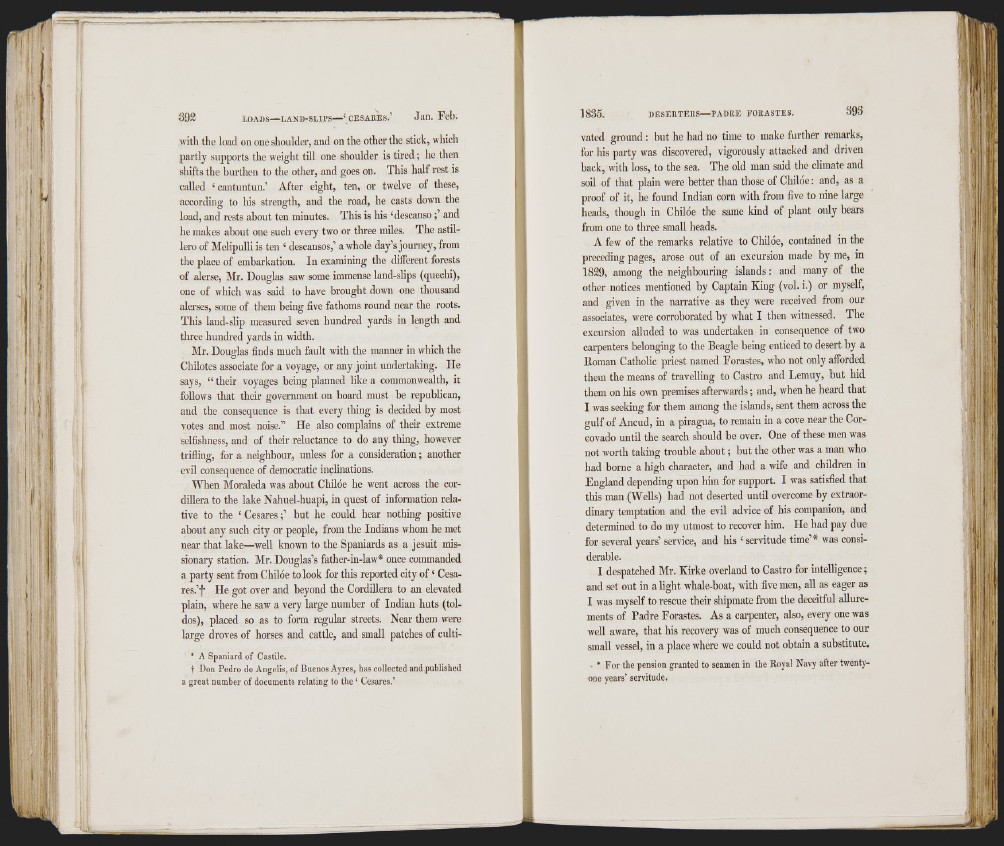
■1,1
íl: i I
I! I ! ' !;
H i
1 7
7 If
il
t
rl
LOADS LAND-SLIl'S ‘ CESARES.’ Jilll. Feb.
with the load on one shoulder, and on the other the stick, which
partly supports the weight till one shoulder is tired; he then
shifts the burthen to the other, and goes on. This half rest is
called ‘ cantuntun.’ After eight, ten, or twelve of these,
according to his strength, and the road, he casts down the
load, and rests about ten minutes. This is his ‘descanso ;’ and
he malíes about one such every two or three miles. The astillero
of Melipulli is ten ‘ descansos,’ a whole day’s journey, from
the place of embarkation. In examining the different forests
of alerse, Mr. Douglas saw some immense land-slips (quechi),
one of which was said to have brought down one thousand
alerses, some of them being five fathoms round near the roots.
This land-slip measured seven hundred yards in length and
three hundred yards in width.
Mr. Douglas finds much fault with the manner in which the
Chilotes associate for a voyage, or any joint undertaking. He
says, “ their voyages being planned like a commonwealth, it
follows that their government on board must be republican,
and the consequence is that every thing is decided by most
votes and most noise.” He also complains of their extreme
selfishness, and of their reluctance to do any thing, however
trifling, for a neighbour, unless for a consideration; another
evil consequence of democratic inclinations.
When Moraleda was about Chilóe he went across the cordillera
to the lake Nahuel-huapi, in quest of information relative
to the ‘ Cesares;’ but he could hear nothing positive
about any such city or people, from the Indians whom he met
near that lake—well known to the Spaniards as a Jesuit missionary
station. Mr. Douglas’s father-in-law* once commanded
a party sent from Chilóe to look for this reported city of ‘ Cesares.’!
He got over and beyond the Cordillera to an elevated
plain, where he saw a very large number of Indian huts (toldos),
placed so as to form regular streets. Near them were
large droves of horses and cattle, and small patches of culti-
* A Spaniard of Castile.
t Don Pedro de Angelis, of Buenos Ayres, has collected and published
a great number of documents relating to the ‘ Cesares.’
vated ground : but he had no time to make further remarks,
for his party was discovered, vigorously attacked and driven
back, with loss, to the sea. The old man said the climate and
soil of that plain were better than those of Chilóe: and, as a
proof of it, he found Indian corn with from five to nine large
heads, though in Chilóe the same kind of plant only bears
from one to three small heads.
A few of the remarks relative to Chilóe, contained in the
preceding pages, arose out of an excursion made by me, in
1829, among the neighbouring islands ; and many of the
other notices mentioned by Captain King (vol. i.) or myself,
and given in the narrative as they were received from our
associates, were corroborated by wbat I then witnessed. The
excursion alluded to was undertaken in consequence of two
carpenters belonging to the Beagle being enticed to desert by a
Roman Catholic priest named Forastes, who not only afforded
them the means of travelling to Castro and Lemuy, but hid
them on his own premises afterwards; and, when he heard that
I was seeking for them among the islands, sent them across the
gulf of Ancud, in a piragua, to remain in a cove near the Corcovado
until the search should be over. One of these men was
not worth taking trouble about; but the other was a man who
had borne a high character, and had a wife and children in
Fngland depending upon him for support. I was satisfied that
this man (Wells) had not deserted until overcome by extraordinary
temptation and the evil advice of his companion, and
determined to do my utmost to recover him. He had pay due
for several years’ service, and his ‘ servitude time’* was considerable.
I despatched Mr. Kirke overland to Castro for intelligence;
and set out in a light whale-boat, with five men, all as eager as
I was myself to rescue their shipmate from the deceitful allurements
of Padre Forastes. As a carpenter, also, every one was
well aware, that his recovery was of much consequence to our
small vessel, in a place where we could not obtain a substitute.
. * For the pension granted to seamen in the Royal Navy after twenty-
one years’ servitude.
fiif'
I
,41
! I: I